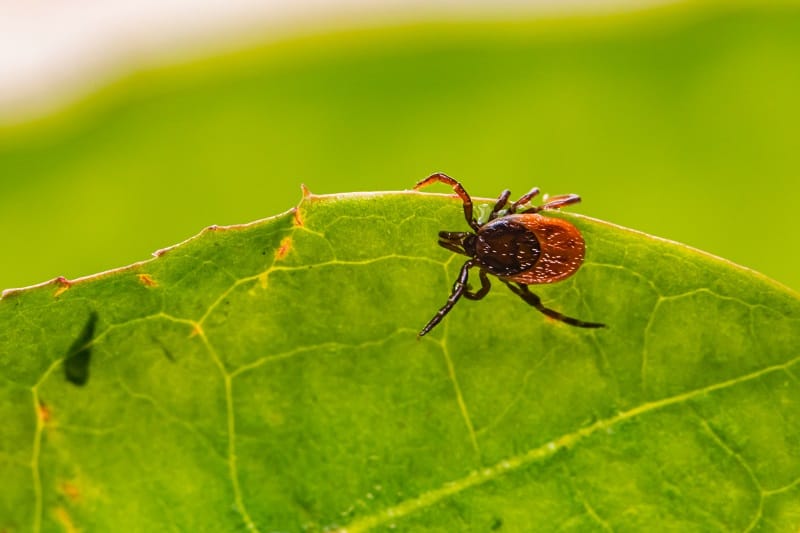There are roughly 850 species of ticks around the world, out of which only a few carry pathogens. The main threat to humans is the common tick (Ixodes ricinus), which can transmit Lyme disease, viral meningitis, and other infections to humans by sucking blood. Ticks also use birds and reptiles as hosts, but with varying frequency from one region to another, they often attach themselves to grazing domestic animals, hunting, herding and stray dogs and even cats moving through woodland and meadows, which then introduce the parasites into populated settlements.
We can use chemicals to control various unwanted arthropods such as ticks, but spraying poisons around is not the best thing for our environment. There are other solutions that are otherwise harmless but are efficient in keeping ticks at bay.
Tick control depends on where you are when you take action to keep the bloodsuckers away. If you are in the woods or fields, then wearing properly sealed clothing and using tick repellent ointments is the best solution. But if you want to chase the pesky parasites away from your own backyard or a playground, you will need to resort to other methods.
Ticks are lurking in our gardens too, but there are some efficient ways to chase them away.
Ticks wait on the leaves of bushes and trees, and very often in the grass, to latch onto their passing prey. If you do some sport, play or sunbathe in a grassy area, for example, you should know that 80 per cent of the ticks are in the three-metre strip of grass right next to the path. They particularly like it if trees, bushes, or fences around the lawn provide a little shade, or if leafy plants grow too abundantly in the grass.
However, ticks do not like dry and sunny places. Therefore, it is a good idea to design your garden so that there is a definite dividing strip between the lawn and the shrubs, and the area under bushes should be covered with wood chips or gravel, according to leading American tick and Lyme disease expert Thomas Mather.

Fighting ticks is a continuous war, not a single battle!
It is important to have a strategic approach in the war against ticks. If we just attack them now and then – with a little spraying, for example – we can keep them away for a while, but after a while they come back. The best solution is to discourage them. To do this, it is good to know that ticks have a particular aversion to certain plants. For example, lavender, fern, rosemary, marigold, sage, and scented catnip scare them away. Such plants should therefore always be kept growing in the garden, especially around the fence, to keep parasites away from the often-used interior of the garden area.
Cedar oil
Essential oils derived from pine trees, such as cedar oil, are non-toxic, and act as natural tick and insect repellents that can be applied to clothing or skin, or even sprayed on plants. Research shows that cedar oil diluted with alcohol can kill up to 100 percent of ticks. Insecticide companies also know that cedar oil can block the olfactory receptors of ticks, disrupt their bodily processes, dehydrate them and kill them in their nymph state.
Guinea fowl
In areas where there are a lot of ticks, it makes sense to keep a pet that is a real specialist in killing them. The guinea fowl, a bird originating in Africa, finds ticks a tasty treat and is very efficient at finding these bloodsuckers. Studies have shown that guinea fowls can significantly reduce the number of ticks hiding on thick-leaved plants growing on lawns. What you need to know about guinea fowls is that they do not completely clean the yard of parasites one hundred percent; nevertheless, they help a lot, and in addition they are fairly undemanding regarding their housing conditions, and they are fine on their own. They are fiercely protective of their territory, and if they do not like intruders, they make a lot of noise – much to the delight of their neighbours.
Eucalyptus oil
Oil extracted from the leaves of the lemon eucalyptus tree growing in Australia and its synthetic version (PM-para-mentan-3,8-diol) are both effective tick repellents. Eucalyptus oil has a pleasant fragrance and provides natural protection for six to seven hours. In addition, if you apply the oil to a tick that has got stuck into your skin, it will soon fall off.
Garlic oil
Those who do not like spraying chemicals on their lawn are forced to look for alternative solutions. One of the best of these is garlic oil, which has been shown in one study to reduce the number of ticks in the nymph state. The effect can be enhanced by mixing garlic oil with cedar oil, mix with water and spray onto ticks or to areas frequented by ticks. Garlic does repel ticks, but it does not kill them, and its active ingredients degrade quickly. Therefore, spraying should be more frequent than with synthetic products, but for those who prefer a natural solution, this is a sacrifice they will certainly make.
Tick-killing fungus
A naturally occurring parasitic fungus (otherwise harmless to the environment and humans) found in many parts of the world, Metarhizium anisopliae, is deadly to ticks. Studies have shown that spraying a solution containing the spores of this fungus can significantly reduce the tick population. Researchers at the Cary Institute for Environmental Studies have found that the fungus is particularly effective when hosts such as mice are treated with the spores, which stick to their fur and get into their nests.

